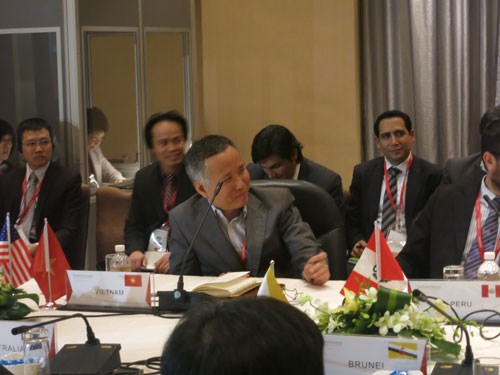Chief negotiators resume TPP talks in Guam

Kyodo | May 16, 2015
Chief negotiators resume TPP talks in Guam
Chief negotiators from 12 countries resumed talks Saturday in Guam on a U.S.-led Pacific free trade initiative, and will seek to narrow remaining gaps over intellectual property and other sticking points blocking a deal affecting roughly 40 percent of world trade.
The prospects of the 10-day session are unclear, however, as the U.S. Congress has yet to pass a fast-track trade bill seen as crucial to reaching agreement on the Trans-Pacific Partnership trade pact.
During the session, working group meetings on intellectual property and other areas will take place, as well as various gatherings of small groups of the countries engaged in the negotiations.
U.S. Undersecretary for Economic Growth, Energy and the Environment Catherine Novelli said in late April that ministerial talks will be held from May 26 to 28 in the Philippines to seek ways to conclude the deal as soon as possible. Other sources said the venue might be Guam.
Japan’s chief TPP negotiator, Koji Tsuruoka, has said that giving Trade Promotion Authority to U.S. President Barack Obama is indispensable to concluding a Pacific trade deal anytime soon.
TPP minister Akira Amari has said reaching a TPP deal before the U.S. Congress passes a TPA bill would be difficult.
On Thursday the U.S. Senate decided to begin debate on the bill, two days after striking down the plan. But the House of Representatives has yet to decide whether to consider such legislation.
As the 12 countries are struggling to conclude the TPP talks later this year, negotiation sources said that without Congress voting to grant TPA authority to the Obama administration, many countries may be unwilling to propose concessions for fear the U.S. legislature could reject them.
If a TPA bill were passed, the U.S. Congress would only be allowed to vote to approve or reject a trade deal in its entirety, and without amendments.
Beside the United States and Japan, the other 10 countries involved in the TPP negotiations are Australia, Brunei, Canada, Chile, Malaysia, Mexico, New Zealand, Peru, Singapore and Vietnam.





